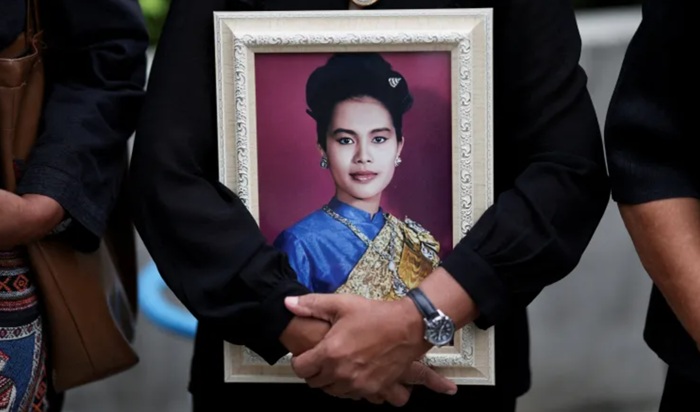
Thailand is in mourning following the royal palace’s announcement that former Queen Sirikit, the mother of the current Thai King Maha Vajiralongkorn and wife of the nation’s late and longest-reigning monarch Bhumibol Adulyadej, has died at the age of 93.
“Her Majesty’s condition worsened until Friday and she passed away at 9:21pm … at Chulalongkorn Hospital at age 93,” the palace said in a statement on Saturday.
Sirikit was married to King Bhumibol, who died in 2016 after seven decades on the throne.
She had been dealing with a blood infection since October 17, and despite her medical team’s efforts, her condition did not improve, according to reports.
A government spokesman said Thai Prime Minister Anutin Charnvirakul had cancelled his Saturday flight to Malaysia – where the ASEAN leaders’ summit will be held from Sunday to Tuesday – following news of the Queen Mother’s death.
The Thai leader instead held a cabinet meeting to discuss funeral arrangements. The atmosphere at the meeting was sombre, according to Thai news outlet The Nation, with all government officials present dressed in black.
Prime Minister Anutin will now fly to Malaysia on Sunday, according to The Nation, the same day US President Donald Trump is set to oversee the signing of a peace agreement between Thailand and Cambodia after a border dispute escalated into all-out conflict in July.
King Vajiralongkorn has decreed that a one-year official mourning period will be observed by members of the royal family and royal servants from the date of his mother’s passing, according to the Thai PBS media outlet.
The late Queen Mother’s remains will be enshrined in Bangkok’s Grand Palace.
Although overshadowed by the stature of her late husband and her son, who is now king, Sirikit was a similarly beloved figure across much of the country, with her August 12 birthday celebrated as Mother’s Day.
Even during widespread student-led protests in 2020 and 2021 – which morphed into unprecedented public criticism of the monarchy and calls to repeal draconian lese-majeste laws – protesters’ ire was largely directed at the king rather than his parents.
The royal family is venerated in Thailand, and the monarchy is protected by some of the world’s harshest laws banning criticism of the institution.
Royal family members are treated by many as semi-divine figures and lavished with glowing media coverage and gold-adorned portraits hanging in public spaces and private homes nationwide.
King Bhumibol’s death in 2016 was followed by intense displays of public grief and a yearlong official mourning period, with many Thais choosing to wear black for its duration.
Royal fashion icon
Sirikit was born into a rich, aristocratic family in Bangkok in 1932, the year absolute monarchy was replaced by a constitutional system in Thailand.
She met Bhumibol in 1948 in Paris, where her father was the Thai ambassador and the 16-year-old Sirikit was studying music and languages.
The pair would marry two years later on April 28, 1950, a week before Bhumibol was officially crowned as Rama IX of the Chakri Dynasty.
Sirikit was given the royal title Somdet Phra Nang Chao Sirikit Phra Borommarachininat. The couple had four children – King Vajiralongkorn, and princesses Ubolratana, Sirindhorn and Chulabhorn.
During their early decades on the throne, the young Thai royals crisscrossed the world as goodwill ambassadors, forging personal ties with world leaders, with Sirikit becoming known internationally for her fashion sense.
By the 1970s, the royals had turned to Thailand’s domestic problems, setting up development programmes to address social and environmental issues, including deforestation, rural poverty and opium addiction among hill tribes in the north of the country.
Their charitable activities were televised each evening on the country’s Royal Bulletin.
“Misunderstandings arise between people in rural areas and the rich, so-called civilised people in Bangkok,” she told The Associated Press news agency in 1979.
“People in rural Thailand say they are neglected, and we try to fill that gap by staying with them in remote areas,” she said.
By the 1980s, Sirikit was often ill, at one point disappearing from public view for several months. By the early- to mid-2000s, she had taken on a more politicised role in public life amid a period of heightened tension between Thailand’s royalist Yellow Shirts and the Red Shirt movement of the rural underclass.
Sirikit expressed public sympathy with royalist demonstrators, and in a highly symbolic act, attended the 2008 funeral of People’s Alliance for Democracy member Angkhana Radappanyawutt, who died during clashes with police.
Sirikit suffered from numerous ailments in her later life, rarely appearing in public after suffering a debilitating stroke in 2012.
She was admitted to Bangkok’s Chulalongkorn Hospital in September 2019, receiving long-term care there until her passing. (Al Jazeera)
